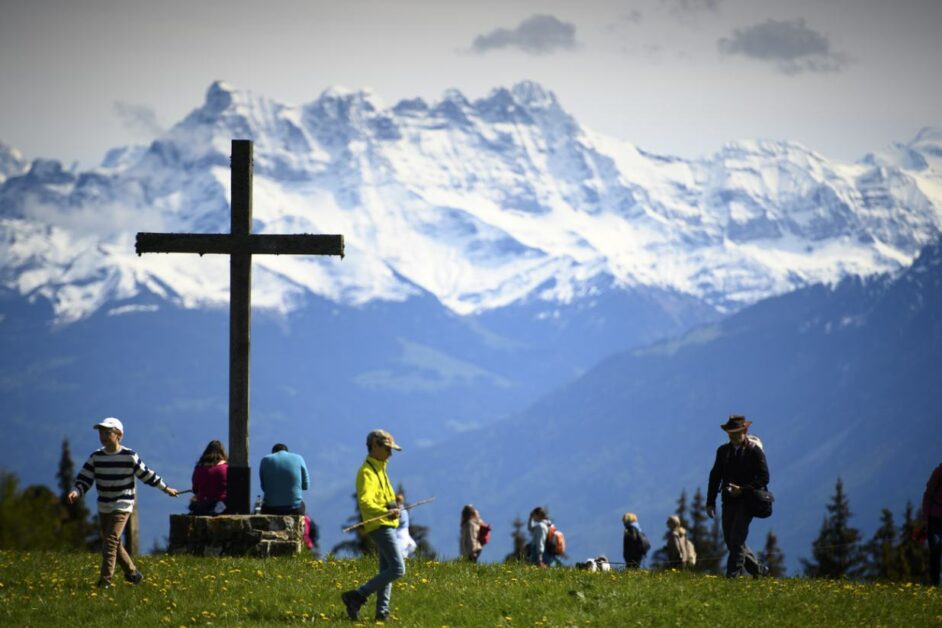Sun, Feb 25th 2024
In this weeks roundup, Ruag MRO amid scandal criticisms, Switzerland’s energy surplus in a post-blackout recovery, and the looming pension crisis for future retirees.

After Chairman Nicolas Perrin, his deputy Heinz Liechti is also leaving the armaments company Ruag MRO.
Like Perrin, Liechti has been criticized for failing to get to grips with the scandals at Ruag. Specifically, one insider criticizes Liechti’s role in the Ruag Innovation Organization (RIO), which costs CHF 13 million a year.
Officially, this is where “the threads for innovative ideas and products come together”. The unit is supposed to help Ruag “win new customers, develop alternative business models and establish itself in other markets”. However, RIO Ruag is regarded internally as a penny grave.
Just a year ago, the country was still shaking from the blackout. The Federal Council made dramatic appeals to save energy. This winter, things look very different.
During the cold season, Switzerland sold more electricity abroad than it had to import. This is shown by the latest market data analyzed by the Swiss Federal Office of Energy.
These show an export surplus of 700 gigawatt hours from October to February. This corresponds to the average annual consumption of around 175,000 four-person households.
For GLP leader Jürg Grossen, the new figures show that the energy transition is on track. “It is remarkable that we are experiencing such a winter just one year after the shortage.”
The top electricity regulator also confirms the comfortable situation: “So far, we have a slightly positive balance over the entire winter,” says Werner Luginbühl. “We have a good situation.”
The majority of current pensioners can live well on the AHV and pension fund – only around 20 percent of them are poor or at risk of poverty. However, studies show that the next generation will fall into a pension hole.
This is because the retirement assets of pension funds are in decline. Those aged 58 to 68 will be hit the hardest. They are being penalized twice over: their retirement assets have earned poor interest and the conversion rates are now lower.
Even the 13th AHV pension would not be enough to compensate for the losses for many. However, 50-year-olds and younger can hope that their pensions will be higher again. For trade unions, the declining 2nd pillar pensions are an important argument in the referendum campaign. This is leading to a dispute with the pension funds.
Men are now the victims in almost 30 percent of cases of domestic violence in Switzerland. While the federal government recorded around 2,300 male victims in 2009, this figure has now risen to 3,400.
It is a misconception that they only suffer psychological violence. In the last reporting year, 2022, there were almost as many attempted homicides against men as against women in the domestic environment.
The police recorded 41 serious assaults on men and 79 on women. The genders are also becoming more equal when it comes to domestic violence in old age: At the Independent Complaints Office for the Elderly, 36 percent of reports last year concerned men, compared to 24 percent the year before.
Around ten years ago, the Zug-based commodities group Glencore granted Chad a loan of 1.45 billion US dollars. The African country was supposed to repay this amount in the following years in the form of raw material deliveries.
The deal proved fatal for Chad. In the weeks and months after the contract was signed, the price of oil plummeted. As a result, Chad had to hand over almost its entire national oil production to Glencore – and fell into a devastating spiral of debt.
The British investigative platform Source Material have now emerged: A businessman from Cameroon, who was significantly involved in the controversial oil trade and officially represented the interests of Chad, was secretly working for Glencore.
In the coming years, the shortage of living space and price increases will become even more acute. Economists at Lucerne University of Applied Sciences and Arts estimate that the potential in all available building zones is only around a third or a quarter of what was previously assumed.
Martin Hofer, architect and co-founder of the consulting firm Wüest Partner, criticizes spatial planning: “We cannot proceed purely in terms of planning law and assign people a place to live.” Hofer focuses on locations that are particularly popular with people due to their close proximity to urban centers.
He advocates opening up open spaces at the city limits for residential purposes: “Such zoning should no longer be taboo.” The Federal Office for Spatial Development (ARE) rejects the criticism that the potential of building zones has been misjudged.
From March, the public transport industry organization, Alliance Swisspass, will be testing its new digital pricing model. “MyRide” is geared towards digitalization and uses a smartphone to identify the routes passengers travel on public transport. Billing now takes place afterwards instead of before the journey.
Those who travel a lot will receive lower prices. But it will be more expensive at peak times. Opposition to the planned offer is now growing. Three other organizations have joined an alliance of two associations that criticize the Alliance Swisspass project in principle.
Switzerland can look forward to an unusually warm spring. This is shown by the new seasonal outlook from Meteo Switzerland. According to the special forecast, there is a high probability that the average temperature in the months of March to May will be above 10.4 degrees.
The long-term average is below 10 degrees. For western Switzerland, the weather service is forecasting an average temperature of more than 11 degrees, while sunny Ticino can even look forward to over 12.8 degrees. Long-term forecasts are still a young discipline in climate research.
Switzerland is one of the leading countries in Europe. Nevertheless, Stephan Bader from Meteo Switzerland points out to the newspaper: “Unlike weather forecasts, long-term forecasts are naturally subject to a high degree of uncertainty.”
©Keystone/SDA
